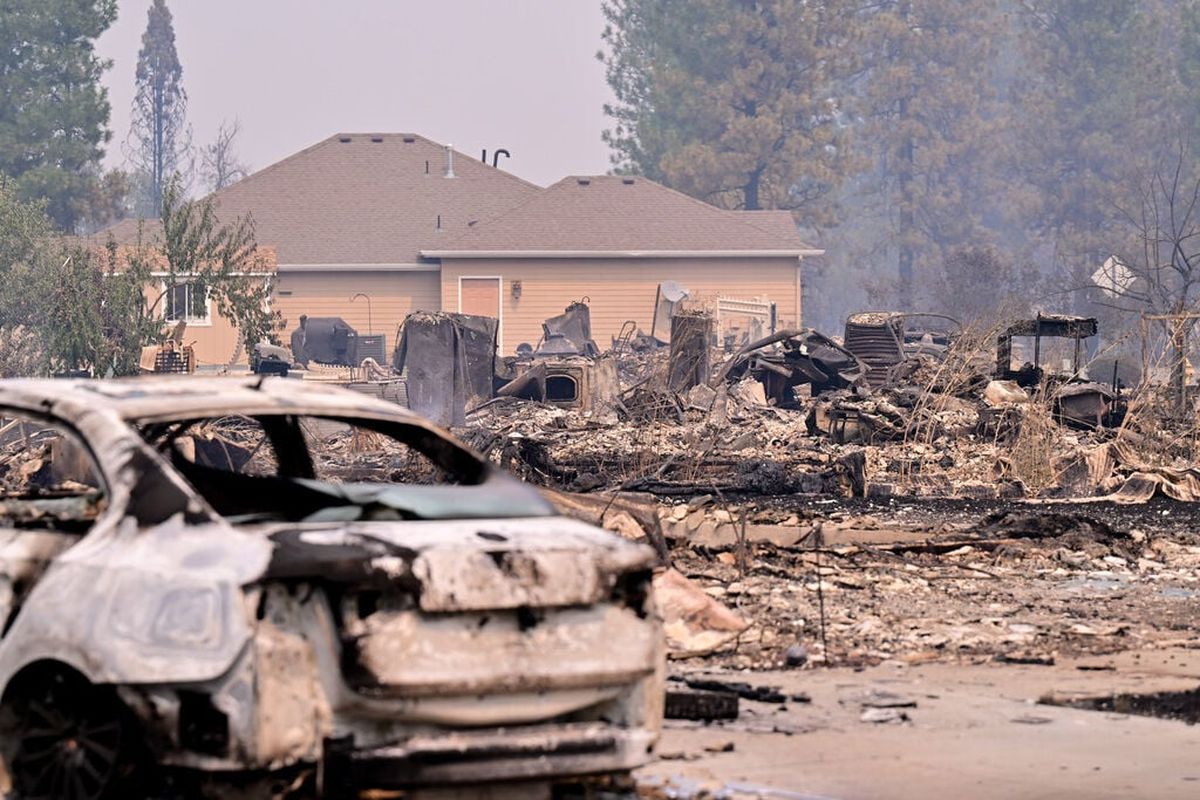Spokane County to receive additional $44 million in federal funding to assist victims of Gray, Oregon Road fires

Spokane County is set to receive more than $44 million in federal funding intended to fill gaps for those still recovering from the devastating 2023 wildfires in Medical Lake and Elk.
Sen. Patty Murray, who negotiated the federal legislation that made the funding available, said the dollars will support long-term recovery efforts for one of the most destructive wildfire events in the state.
Spokane County is the only recipient in Washington.
The funding, including Spokane County’s portion, is in addition to millions in federal aid provided through the Federal Emergency Management Agency when a major disaster declaration is issued. Biden issued a declaration for the Gray and Oregon Road wildfires last February, six months after the blazes broke out.
All five members of the Spokane County Commission thanked Murray for her work to assist their constituents, many of whom are still in the midst of living in temporary homes, clearing toxic debris left on their property and working to rebuild their homes.
Commissioner Josh Kerns, who represents the communities affected by the Oregon fire, said he expects that work to continue for years to come.
“The reality is, some of my constituents are still sifting through the ashes and working to recover from this tragedy,” Kerns said in a written statement. “Thanks to Senator Murray’s efforts in the end-of-year package, we should be able to put more dollars to work to maximize the impact on our community.”
HUD said in its release that the Community Development Block Grants – Disaster Recovery are intended to primarily assist low- and moderate-income households and communities, and can be used to replace and restore damaged affordable housing, repair and improve public infrastructure, revitalize the local economy through support for small businesses, and implement mitigation efforts to reduce risk in the event of another disaster.
The grants will pay for costs not covered by insurance or other federal and local sources, the department’s release states. As the local recipient, Spokane County will determine how the $44 million is used.
Rick Knapp, an Elk resident and volunteer with the Spokane Regional Long Term Recovery Group, said the funding could help the group complete their long-sought goal of building houses for those who would otherwise not be able to rebuild.
Knapp said they’ve secured funding for at least eight houses, but he estimates there’s at least a dozen more families who still need help. He expects to meet with other members of the organization this week to discuss the possibilities made available by the grant.
“All along the way, there are costs that we are trying to overcome so that we can provide some homes for these families that didn’t have insurance or were very underinsured,” Knapp said.
“But let’s face it, everybody is underinsured. I’m underinsured, you know?” he added.
Data collected by the Washington state Office of the Insurance Commissioner shows many homeowners affected by the fires were underinsured. As of November, insurance companies paid out more than $212 million for claims from the Oregon Road and Gray fires, but most homeowners were not made whole from their losses.
Adding to the strife for those aiming to rebuild, some insurance companies are dropping clients, telling others they won’t be renewed or, even in cases of homeowners who avoided damage, are raising monthly rates to levels they can’t afford, as reported by The Spokesman-Review last spring.
“Even people that were not in the fire area or live in the surrounding area, their insurance companies dropped them when they were up for renewal,” Knapp said.
Insurance companies dropped 32% of all persons who filed claims for significant losses stemming from the fires, as reported by The Spokesman-Review. Of those canceled policies, some 36 were not renewed, while 79 others were canceled midterm.
Medical Lake Mayor Terri Cooper, a member of the recovery group, said she’s grateful Murray and former Congresswoman Cathy McMorris Rodgers fought to ensure local wildfire victims were not forgotten.
Recovering from a wildfire is a lengthy process, Cooper said, and many of her neighbors are experiencing their second winter in temporary shelters, RV’s and trailers, while still grappling with insurance woes and complicated permitting processes. The Salvation Army is under contract to provide case managers for up to two years to help fire victims navigate the process of putting their lives back together.
Cooper said she hopes some of the funding will be used for additional case management services, “so that we can not only still do reimbursement, but also identify those still unmet needs, and get funding for those unmet needs.”
“That’s a really important piece,” Cooper said.
Another aspect of the grant that excites Cooper is the possibility of repairing and improving her city’s infrastructure. She said some roads in the area “have just been demolished” by the wildfire and the construction and heavy machinery that followed, like those on the west shore of Silver Lake.
“The recovery work is still probably two years out before people can really get back in their home, get their legs back under them and get started,” Cooper said. “I’m really happy about the opportunity to do more. I think the money can go to good use, and, well, we need it.”